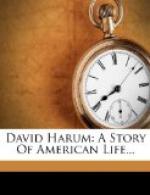“I reckon,” said David, “‘t she kind o’ missed the comp’ny an’ the talk at table, an’ the goin’s on gen’ally, an’ mebbe the work of runnin’ the place—she was a great worker—an’ it got to be some diff’rent, I s’pose, after a spell, settin’ down to three meals a day with jest only me ‘stid of a tableful, to say nothin’ of the evenin’s. I was glad enough to have a place of my own, but at the same time I hadn’t ben used to settin’ ‘round with nothin’ pertic’ler to do or say, with somebody else that hadn’t neither, an’ I wa’n’t then nor ain’t now, fer that matter, any great hand fer readin’. Then, too, we’d moved into a diff’rent part o’ the town where my wife wa’n’t acquainted. Wa’al, anyway, fust things begun to drag some—she begun to have spells of not speakin’, an’ then she begun to git notions about me. Once in a while I’d have to go down town on some bus’nis in the evenin’. She didn’t seem to mind it at fust, but bom-by she got it into her head that the’ wa’n’t so much bus’nis goin’ on as I made out, an’ though along that time she’d set sometimes mebbe the hull evenin’ without sayin’ anythin’ more ’n yes or no, an’ putty often not that, yet if I went out there’d be a flare-up; an’ as things went on the’d be spells fer a fortni’t together when I couldn’t any time of day git a word out of her hardly, unless it was to go fer me ‘bout somethin’ that mebbe I’d done an’ mebbe I hadn’t—it didn’t make no diff’rence. An’ when them spells was on, what she didn’t take out o’ me she did out o’ the house—diggin’ an’ scrubbin’, takin’ up carpits, layin’ down carpits, shiftin’ the furniture, eatin’ one day in the kitchin an’ another in the settin’ room, an’ sleepin’ most anywhere. She wa’n’t real well after a while, an’ the wuss she seemed to feel, the fiercer she was fer scrubbin’ an’ diggin’ an’ upsettin’ things in gen’ral, an’ bom-by she got so she couldn’t keep a hired girl in the house more ’n a day or two at a time. She either wouldn’t have ’em, or they wouldn’t stay, an’ more ’n half the time we was without one. This can’t int’rist you much, can it?” said Mr. Harum, turning to his companion.
“On the contrary,” replied John, “it interests me very much. I was thinking,” he added, “that probably the state of your wife’s health had a good deal to do with her actions and views of things, but it must have been pretty hard on you all the same.”
“Wa’al, yes,” said David, “I guess that’s so. Her health wa’n’t jest right, an’ she showed it in her looks. I noticed that she’d pined an’ pindled some, but I thought the’ was some natural criss-crossedniss mixed up into it too. But I tried to make allow’nces an’ the best o’ things, an’ git along ’s well ‘s I could; but things kind o’ got wuss an’ wuss. I told ye that she begun to have notions about me, an’ ’t ain’t hardly nec’sary to say what shape they took, an’ after a while, mebbe a year ’n a half, she got so ’t she wa’n’t satisfied to know where I was nights—she




